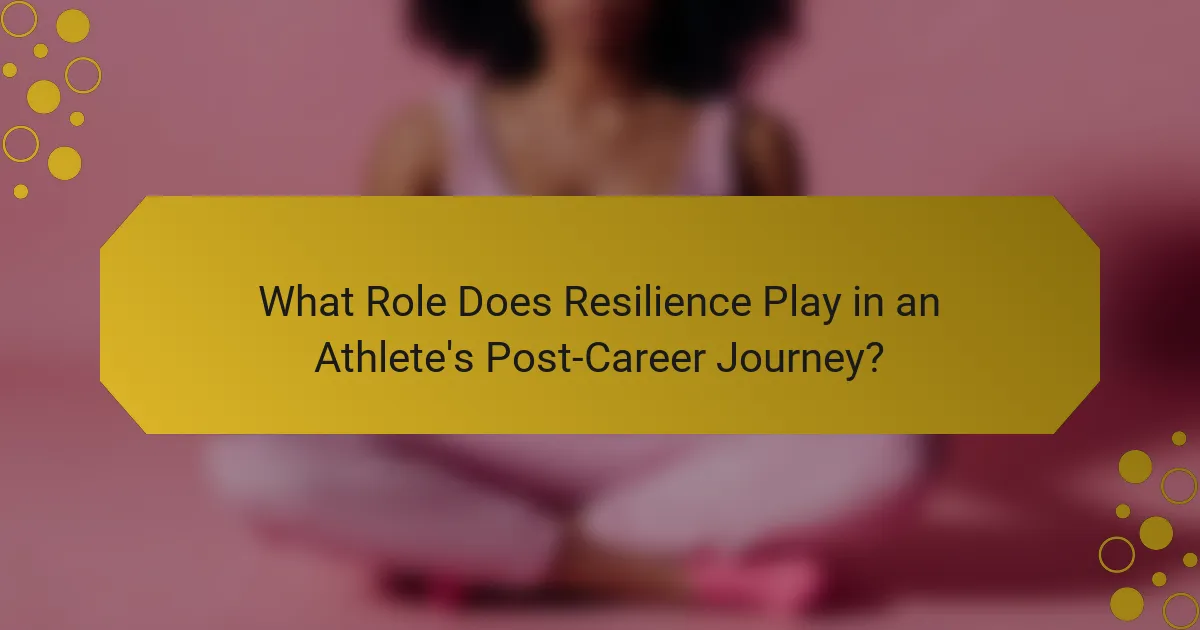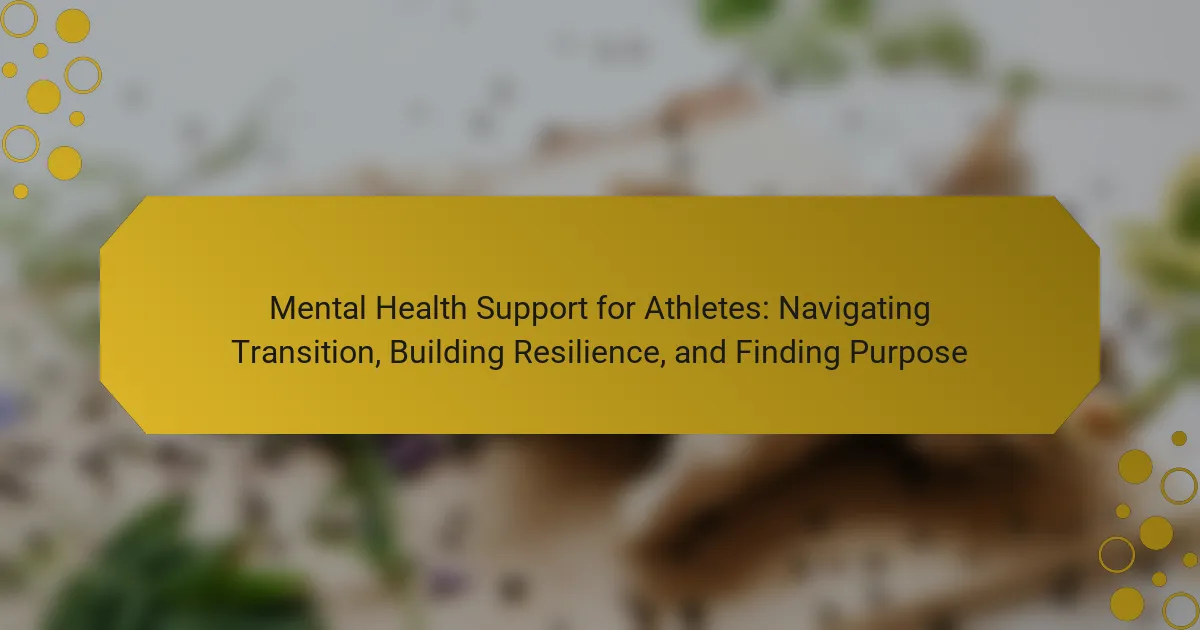Mental health support is essential for athletes transitioning to life after sports. This article explores strategies for building resilience, accessing tailored resources, and finding new purpose. It highlights the importance of therapy, support groups, and mindfulness practices in enhancing emotional well-being. Additionally, it discusses the unique challenges athletes face and the value of community involvement in fostering a fulfilling post-career life.

How Can Athletes Navigate the Transition to Life After Sports?
Athletes can successfully navigate the transition to life after sports by prioritising mental health support, building resilience, and finding new purpose. Engaging in therapy can help athletes process their experiences and emotions. Support groups foster connections with others facing similar challenges, promoting a sense of belonging. Developing new skills through education or hobbies can provide a fulfilling direction. Establishing a routine enhances stability, while mindfulness practices improve emotional regulation. Seeking mentorship from former athletes can offer valuable insights and guidance during this transition.
What Are the Common Challenges Faced During Post-Career Transition?
Athletes often face mental health challenges during post-career transitions. Common issues include identity loss, anxiety about the future, and difficulty in finding new purpose. These challenges can hinder resilience and overall well-being. Mental health support is crucial to navigate these transitions effectively.
How Does Retirement Impact Mental Health for Athletes?
Retirement can significantly impact athletes’ mental health, often leading to feelings of loss and identity crisis. Transitioning from a structured, competitive environment can create challenges in finding purpose and maintaining resilience. Studies indicate that athletes may experience increased anxiety and depression during this period. Mental health support, including counselling and peer support, is crucial for navigating this transition effectively. Building coping strategies and fostering a sense of community can enhance athletes’ well-being post-retirement.
What Psychological Factors Contribute to Post-Career Stress?
Psychological factors contributing to post-career stress in athletes include identity loss, social isolation, and performance anxiety. Transitioning from a structured environment to everyday life can lead to feelings of purposelessness. Many athletes struggle with redefining their identity beyond sports, which is a unique attribute of this transition. Studies show that 60% of retired athletes experience significant mental health challenges, highlighting the need for tailored mental health support. Building resilience through counselling and peer support can mitigate these effects.
How Can Athletes Recognize Signs of Mental Health Struggles?
Athletes can recognize signs of mental health struggles by being aware of emotional changes, behavioural shifts, and physical symptoms. Common indicators include increased anxiety, mood swings, withdrawal from social interactions, and changes in performance levels. Monitoring these signs fosters early intervention and support. Regular self-reflection and open communication with coaches or teammates enhance awareness of mental health.

What Role Does Resilience Play in an Athlete’s Post-Career Journey?
Resilience significantly influences an athlete’s post-career journey by fostering adaptability and mental well-being. It enables athletes to navigate the emotional challenges of retirement, such as loss of identity and purpose. Studies show that resilient athletes often engage in new activities or careers, enhancing their overall life satisfaction. Furthermore, resilience training can provide essential coping strategies, making transitions smoother and more fulfilling.
How Can Athletes Build Resilience During Transition?
Athletes can build resilience during transition by embracing mental health support, developing coping strategies, and fostering a sense of purpose. Engaging with mental health professionals can provide essential tools for navigating emotional challenges. Establishing a support network with peers and mentors enhances accountability and encouragement. Mindfulness practices, such as meditation, improve emotional regulation and focus. Setting realistic goals helps athletes maintain motivation and direction during transitions. Resilience is further strengthened by reflecting on past experiences, learning from setbacks, and adapting to new circumstances.
What Techniques Foster Mental Toughness in Retirement?
Techniques that foster mental toughness in retirement include setting clear goals, maintaining a routine, and practicing mindfulness. These strategies help athletes adapt to life after sports by enhancing resilience and purpose. Regular physical activity, social connections, and seeking professional support also play vital roles in this transition. Engaging in new challenges can further strengthen mental fortitude, providing a sense of accomplishment and direction.
How Does Support from Peers Influence Resilience?
Support from peers significantly enhances resilience by providing emotional encouragement and practical advice. Athletes often face unique challenges during transitions, and peer support fosters a sense of belonging and shared experience. This connection can lead to increased motivation and improved coping strategies. Research indicates that social support correlates with better mental health outcomes, reinforcing the importance of community in building resilience. Athletes who engage in supportive peer networks are more likely to maintain focus and purpose, enhancing their overall mental health.

What Unique Mental Health Resources Are Available for Retired Athletes?
Retired athletes can access unique mental health resources tailored to their transition challenges. Programs like the “Athlete Transition Program” offer personalized counselling and peer support. Additionally, organizations such as “The Players’ Tribune” provide platforms for sharing experiences, fostering community. Workshops focused on resilience training and purpose discovery are also available, promoting mental well-being. These resources specifically address the emotional and psychological needs of retired athletes, enhancing their post-career adjustment.
Which Organizations Offer Support for Mental Health in Retired Athletes?
Several organizations provide mental health support for retired athletes. The Professional Athletes Foundation offers counselling and resources tailored to athletes’ unique needs. The NFL Players Association has a program focusing on mental health and wellness. The NBA’s Mental Health and Wellness Program provides resources for former players. The NCAA offers a support network for retired collegiate athletes. Additionally, the Canadian Mental Health Association has initiatives specifically for retired athletes. These organizations aim to assist in navigating the challenges of retirement, building resilience, and finding new purpose.
What Innovative Programs Exist to Aid Transitioning Athletes?
Innovative programs supporting transitioning athletes focus on mental health, resilience, and purpose. Initiatives like Athlete Transition Programs provide counselling, workshops, and peer support networks. These programs emphasize emotional well-being, helping athletes navigate identity shifts after sports. Research shows that structured mental health support reduces anxiety and enhances coping skills, making transitions smoother. Programs often incorporate mindfulness training, career coaching, and community engagement to foster a sense of belonging and purpose.

What Are the Rare Attributes of Mental Health Challenges in Athletes?
Athletes face unique mental health challenges due to high performance expectations, identity issues, and social stigma. Rare attributes include the pressure to maintain peak performance despite mental health struggles, the impact of injuries on self-worth, and the difficulty in transitioning to life after sports. These factors can lead to isolation and reluctance to seek help, complicating recovery. Addressing these rare attributes is crucial for effective mental health support tailored to athletes.
How Do Identity Issues Affect Retired Athletes’ Mental Health?
Identity issues significantly impact retired athletes’ mental health by causing feelings of loss and disconnection. Transitioning from a defined sports identity to a broader societal role can lead to anxiety and depression. Research indicates that 35% of retired athletes experience identity crises, affecting their self-esteem and purpose. Mental health support, emphasizing resilience and purpose, is crucial during this transition. Programs focusing on identity reconstruction can enhance well-being and facilitate a smoother adjustment to life after sports.
What Unique Coping Strategies Are Effective for Athletes?
Unique coping strategies effective for athletes include mindfulness techniques, goal-setting frameworks, and peer support networks. Mindfulness practices help athletes manage stress and enhance focus. Goal-setting frameworks provide clarity and motivation during transitions. Peer support networks foster connection and shared experiences, contributing to resilience and purpose.

How Can Athletes Find Purpose After Their Sports Career?
Athletes can find purpose after their sports career by engaging in mental health support, exploring new passions, and fostering resilience. Transitioning from sports can be challenging, but seeking therapy or counselling helps navigate emotions and builds coping strategies. Many athletes discover fulfillment in mentoring, coaching, or pursuing education, which aligns with their skills and experiences. Community involvement also provides a sense of belonging and purpose, reinforcing their identity beyond athletics. Emphasising personal growth and setting new goals can lead to a rewarding post-sport life.
What Steps Can Athletes Take to Rediscover Their Passion?
Athletes can rediscover their passion by engaging in self-reflection, seeking mental health support, and exploring new interests. First, they should assess their motivations and experiences to understand what drives their passion. Next, connecting with sports psychologists or counsellors can provide tools for managing emotions and stress. Finally, participating in different sports or activities can reignite excitement and foster a sense of purpose.
How Can Volunteering or Mentorship Provide Fulfillment?
Volunteering and mentorship can provide significant fulfillment by fostering connection and purpose. Engaging in these activities enhances mental health by promoting social interaction and building resilience. Studies show that helping others can lead to increased happiness and reduced feelings of isolation. This unique attribute of altruism strengthens the mental well-being of both the mentor and the mentee, creating a supportive community. As a result, athletes navigating transitions can find renewed purpose and motivation through these enriching experiences.
What Role Does Continuing Education Play in Finding New Purpose?
Continuing education plays a crucial role in helping athletes find new purpose after their careers. It provides opportunities for personal growth, skill development, and mental health support. Engaging in learning fosters resilience and helps athletes navigate transitions effectively. Studies show that 70% of former athletes who pursued further education reported improved mental well-being and a clearer sense of direction. This unique attribute of continued learning not only enhances career prospects but also reinforces a sense of identity beyond sports.

What Best Practices Can Athletes Implement for Long-Term Mental Wellbeing?
Athletes can implement practices such as mindfulness, regular mental health check-ins, and building a support network for long-term mental wellbeing. Mindfulness techniques help manage stress and improve focus. Regular check-ins allow athletes to assess their mental state and seek help when needed. Building a support network fosters connection and provides resources for coping with challenges. These strategies enhance resilience and help athletes find purpose beyond their sport.
What Are Common Mistakes Athletes Make in Post-Career Planning?
Athletes often overlook critical aspects in post-career planning, leading to challenges in mental health. Common mistakes include neglecting emotional support, failing to create a structured routine, and underestimating the importance of identity beyond sports. Many athletes do not seek professional help, which can exacerbate feelings of isolation. Additionally, a lack of financial planning can cause stress, impacting overall well-being. Building resilience requires proactive engagement in new interests and community connections to foster a sense of purpose.
How Can Athletes Create a Sustainable Support Network?
Athletes can create a sustainable support network by prioritising open communication, fostering relationships, and engaging with mental health professionals. Building trust with teammates and coaches enhances resilience during transitions. Participating in group activities, such as workshops, encourages shared experiences and emotional support. Establishing regular check-ins can help maintain connections and address mental health concerns proactively.
What Expert Insights Can Guide Athletes in Their Transition?
Expert insights emphasize the importance of mental health support during an athlete’s transition. Strategies include seeking professional counselling, engaging in peer support groups, and practicing mindfulness techniques. These approaches foster resilience and help athletes redefine their purpose post-competition. Research indicates that structured mental health programs significantly reduce anxiety and depression in transitioning athletes. Prioritising mental well-being is crucial for navigating this challenging phase effectively.
